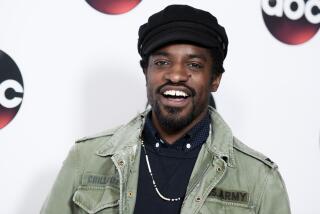Guitarist Charlie Hunter’s sharing spirit
- Share via
Recessionary times call for desperate measures, but Charlie Hunter’s bandmates can rest assured that the title of his upcoming album reflects his mordant sense of humor more than drastic cost cutting.
The seven-string guitar wizard’s upcoming release, “Gentlemen, I Neglected to Inform You You Will Not Be Getting Paid” (Spire Artist Media), features the kind of stinging, telegraphic fret work that’s defined his sound since he emerged on the Bay Area acid jazz scene in the mid-1990s. While he might not be stiffing his sidemen, the economic crisis has forced him to change the way he creates albums and handles personnel.
Slated for release Jan. 12, the self-produced “Gentlemen” employs a heavyweight New York horn section featuring TV on the Radio trumpeter Eric Biondo and trombonists Alan Ferber and Curtis Fowlkes. But Hunter is traveling light for the West Coast tour that brings him to Hermosa Beach’s Saint Rocke on Thursday and to the Mint on Friday and Saturday.
Aside from his regular drummer, Eric Kalb, a slyly funky player who’s toured with the Allman Brothers Band and Deep Banana Blackout, Hunter is picking up the rest of his band on the road, a striking development for a player whose following reaches far beyond jazz’s market niche.
“I’m hiring local cats to do the horn parts,” Hunter, 42, said from his home in Brooklyn. “That’s the way [stuff] is these days. As long as you’ve got the killing drummer, you can take care of business. Eric and I do the lion’s share of playing. We could do all this music as a duo, but it’s the difference between an awesome line drawing and a painting. The horns add the color.”
For the Southland gigs, Hunter is relying upon talent scouting by Ferber, who made an impression on the L.A. scene with his twin brother, drummer Mark Ferber, when they studied at UCLA in the late 1990s. He’s recruited trombonist Garrett Smith, 29, and trumpeter Jumaane Smith (no relation), 28, a Juilliard grad mentored by drum legend Rashied Ali.
“What I really like about Charlie’s approach is that he encourages us to come up with spontaneous backgrounds and to solo over different sections,” said Alan Ferber. “His music is orchestrated in a way where it’s not like you hear three soloists in a row.”
Though rhythm and blues always has been Hunter’s bread and butter, his earthy sensibility often leads people to overlook his resourcefulness as an improviser. He’s naturally drawn to situations where he can bear down rhythmically, like the fusion power trio Garage a Trois with Galactic drummer Stanton Moore and Critters Buggin saxophonist Skerik. But he’s also collaborated with quintessential Downtown drummer Bobby Previte on the free improv project Groundtruther.
Indeed, Hunter almost serves as a bridge between the avant-garde and jazz’s populist edge. When Bay Area clarinetist Ben Goldberg decided he needed to explore rootsy song forms, he called upon Hunter, a collaboration that resulted in the 2009 album “Go Home.”
“I had no idea what it would sound like, but I knew Charlie would cook up some monstrous grooves,” said Goldberg, who pioneered the synthesis of free jazz and traditional Ashkenazi melodies in the New Klezmer Trio. “Having worked with him when he lived in Berkeley, I knew what an absolute genius he is.”
Considering the awe that Hunter inspired when he first appeared with a custom-built eight-string guitar, his economizing on strings has gone relatively unnoticed. In recent years he’s downsized to a seven-string instrument, which doesn’t seem to interfere with the remarkable technique that enables him to generate simultaneous lead and bass lines.
“It’s got most of the range of a bass and a guitar, and I play it like a drum set,” Hunter said. “It sounds even less like a guitar. That’s the quest, to avoid clichés and be its own thing.”
More to Read
The biggest entertainment stories
Get our big stories about Hollywood, film, television, music, arts, culture and more right in your inbox as soon as they publish.
You may occasionally receive promotional content from the Los Angeles Times.










